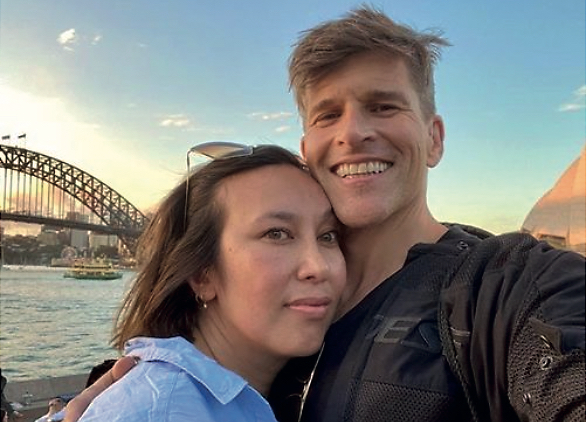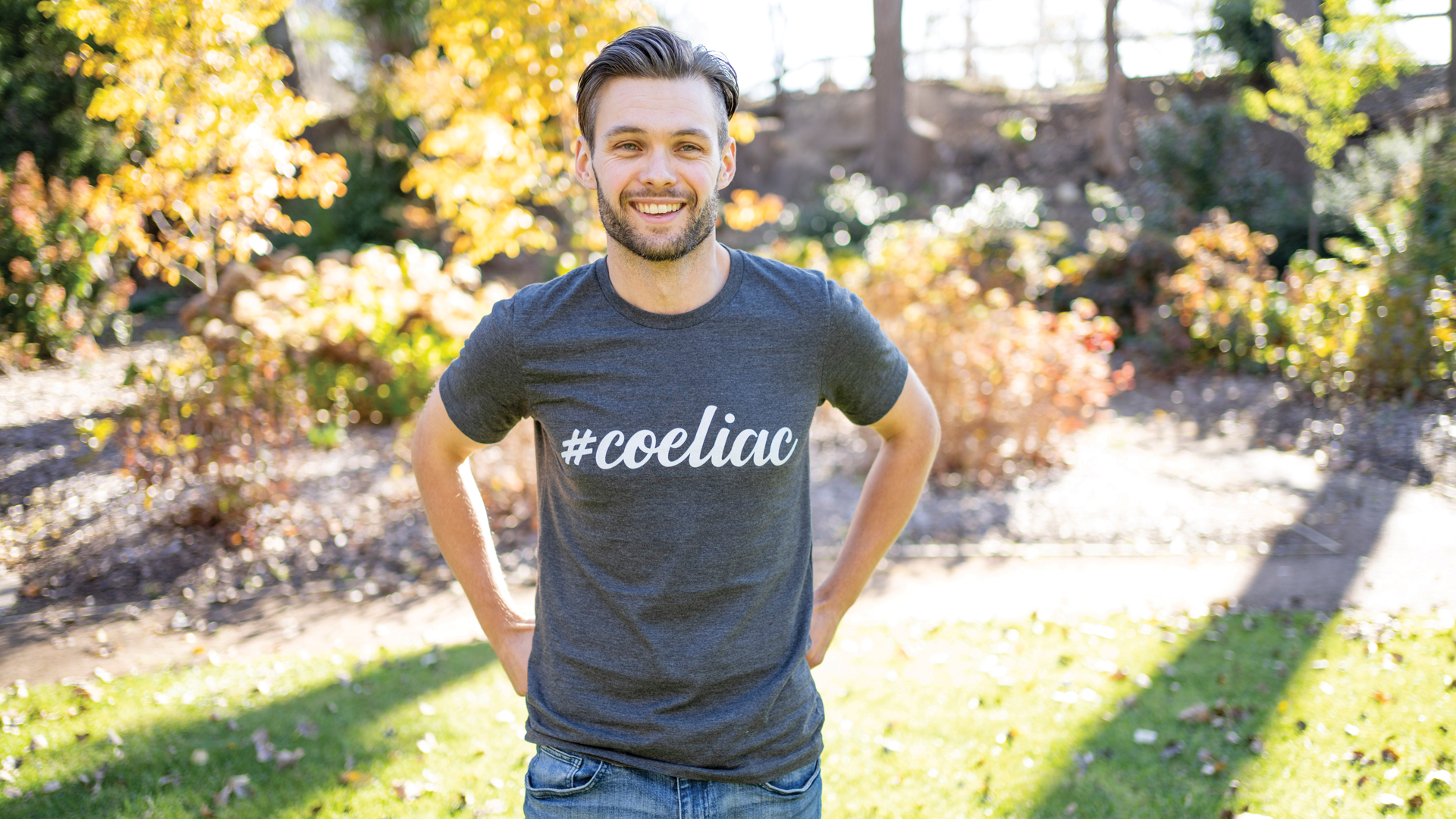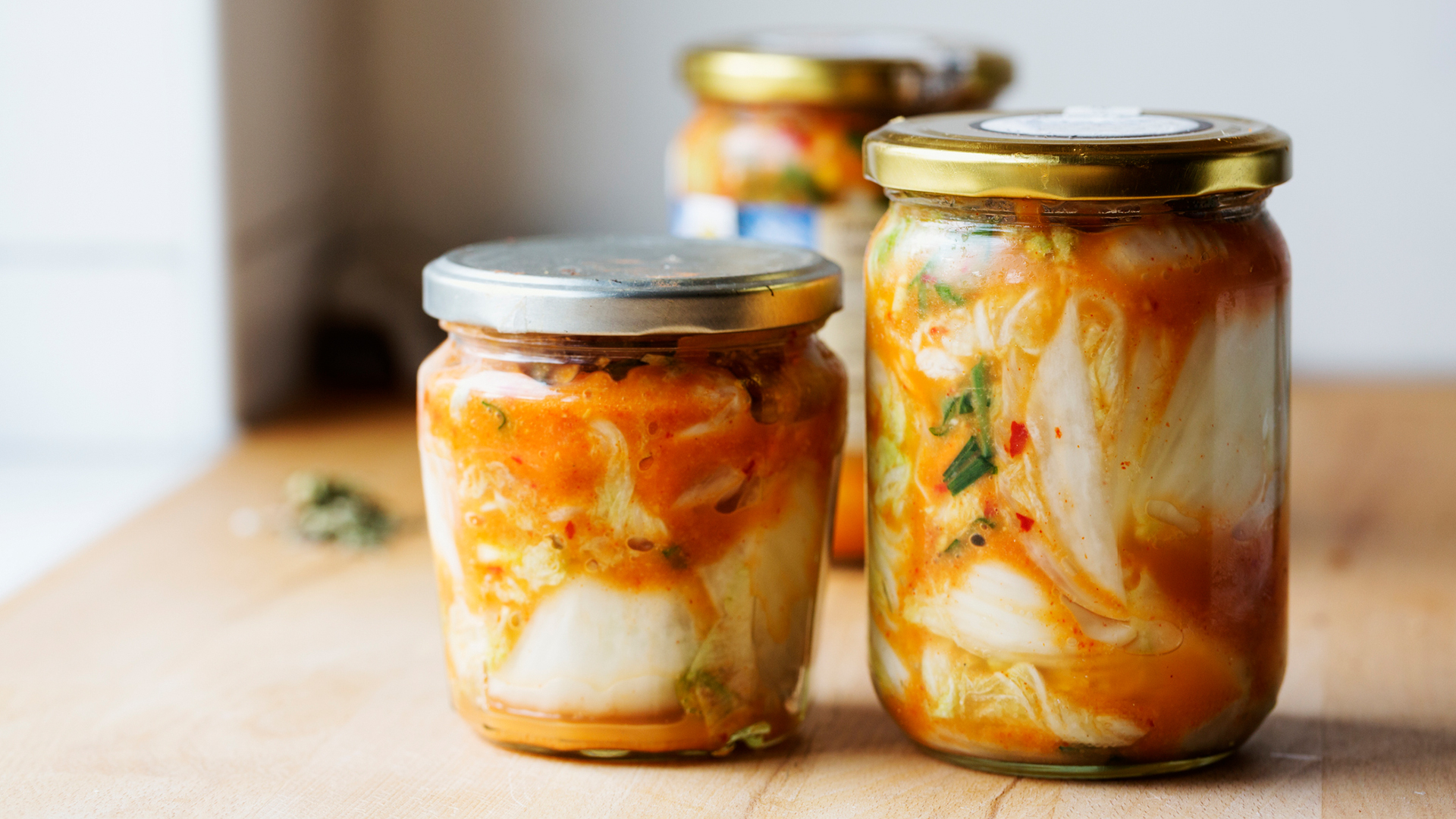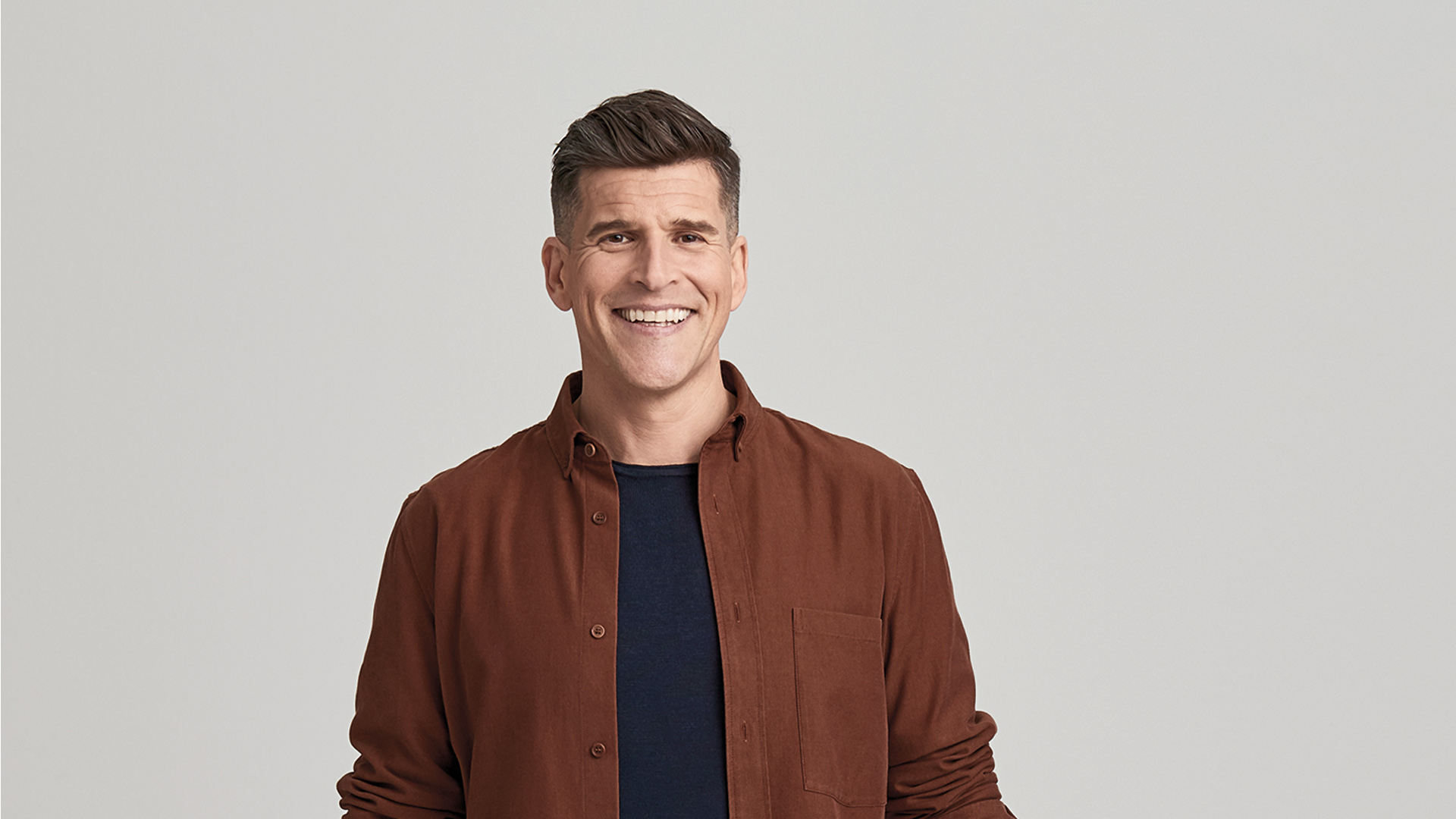ARTICLES > LIFE STORIES
OSHER’S HEALING JOURNEY
The TV personality shares his health battles and how a coeliac disease diagnosis helped him back from the brink.
By Amy Cooper
After lifelong mental and physical health struggles, The Bachelor host and Coeliac Australia member Osher Günsberg has turned his life around. In this exclusive interview, he explains why his coeliac disease diagnosis helped him back from the brink.
Osher’s young son Wolfie has his dad’s winning smile – the adorable little boy is the latest chapter in Osher’s own love story, with his wife Audrey Griffen. The couple married in 2016 after meeting on The Bachelor set two years earlier. In a neat twist of fate, the show for lovelorn singles brought its host the happy ending all its contestants hope for.
Osher’s new family is the source of a deep happiness that’s previously eluded him. And Audrey and Wolfie also helped bring about another major turning point for the TV presenter: his coeliac disease diagnosis.
Once married, Osher and Audrey had begun to try for a baby. But as months passed without the good news they hoped for, they decided to investigate.
“I had been very mentally unwell, and during that time I’d been taking anti-psychotic medication, which helped me get a lot better,” says Osher. “Those kinds of drugs can mess up your testosterone. I had been off the medications for about a year when Audrey and I were trying to conceive, and when yet another month went by without anything happening, we decided to investigate why my hormones weren’t bouncing back.”
At the same time, Osher discovered another health puzzle requiring urgent investigation. He’d taken on the 10-week challenge with Men’s Health magazine – a before and after project where celebrities sign up for a fitness overhaul and display their transformation on the magazine’s cover.
During the health tests required, Osher had a DEXA scan. “It’s a very low radiation X-ray,” Osher explains. “They measured my body mass, lean muscle mass and bone density. It revealed my bone density was strangely low for a 43-year-old.”
“Between that and my extremely low testosterone, I thought: what’s going on here? So I went to the doctor and had a whole range of tests,” he says.
Fortunately, Osher’s doctor had a hunch about what those signs could mean, and she was able to deliver the answers quickly. “I was working on location in New Caledonia when she called me up to tell me ‘I need to talk to you about those blood tests we took the other day. One of them was a test of your coeliac antibodies.’”
OFF THE SCALE
The results left no doubt. “I had so many antibodies, they couldn’t count them. The doctor told me I was literally off the chart,” says Osher. “I was so coeliac they couldn’t even test how coeliac I was!”
“She told me that going forward, I would have to be on a 100 per cent gluten-free diet. This was my treatment and I’ve taken it very seriously ever since.”
First, Osher was referred to a gastroenterologist, for the endoscopy he likes to call the ‘channel tunnel procedure’. “His description was pretty vivid,” Osher says. “He told me: ‘this disease essentially turns your body into a drainpipe. You chew the food, you swallow it, no nutrients are absorbed, and you just poo it out.’”
“Some of the statistics he told me were really alarming. I had no idea that so many people had coeliac disease, and I was amazed to hear that 80 per cent don’t even know about it.”
“What chilled me to the core was learning about people like me who have had no obvious symptoms. I’d been on the road touring with people who had coeliac disease, and I’d seen how sick gluten could make them. I assumed that was how it was for everyone. But the doctor said to me: ‘you are in the group of people that have no symptoms, and you are the most dangerous.’”
A BODY IN SHUTDOWN
Osher vividly recalls how the doctor described the impacts of undiagnosed coeliac disease. “He used his hand like a leaf falling from a tree and explained that you just drift slowly down as you start to become more nutrient deficient, your calcium depletes and your testosterone falls, your body cannibalises itself, and all this can eventually affect your cognitive function. And by the time you’re diagnosed, you might also have related conditions like osteroperosis.”
“I was quite lucky, because somehow my body had hacked its way through and figured out ways to get by, but I was just starting to see the first signs of that body falling to bits.”
If he’d remained undiagnosed for much longer, the consequences could have been very serious. “The gastroenterologist told me that my doctor had done me a massive service by helping me find out about my coeliac disease.”

LETTING GO
Osher ensured his last gluten-filled meal was memorable. “I went with my wife, we sat down face to face, and enjoyed an exquisite bowl of wheat ramen noodles made fresh that morning.
Three days later, the biopsy results confirmed his diagnosis. “The doctor told me I was now in the elite group of people who have to ask for the other menu,” he says.
Osher still had questions. “I know coeliac disease has a gene that just switches it on. When did mine turn on? Was it triggered by a certain event or change?”
He wondered if his mental health battles had played a part. “I’d been really sick to the extent that I ended up experiencing episodes of psychosis that manifested as paranoid delusions. It was horrible. Maybe that was the catalyst.”
Osher’s anxiety and panic attacks had started in childhood, and he tried to cope by comfort eating the hearty foods readily available in a home with a Czech father, Lithuanian mother and grandma who loved to cook. Young Osher secretly binge ate, and by eight years old, he weighed over 48kg and was taken to Weight Watchers by his worried mum.
Later in life, he battled alcoholism, and has been sober since 2010. But his mental health problems escalated. On screen, he was the charismatic, word-perfect TV host, but off camera, he was struggling and suicidal. In 2014, working in Los Angeles, his paranoid delusions led to a nervous breakdown, which he documented with searing honesty in his book Back After the Break.
With help from his doctors and the right medications, he began a steady journey towards better health. Now a passionate mental health advocate, Osher shares that continuing journey on his podcast Better Than Yesterday.
TURNING A CORNER
Acceptance has been key to Osher’s healing process, and he’s at peace with all aspects of his health – including his coeliac disease.
He treasures advice from his father, a retired rheumatologist who counselled many patients with autoimmune conditions over the years. “My dad said: ‘these things happen, and it’s nobody’s fault. The sooner that you accept that it’s happening and focus on the treatment, the better your life will become.’”
“I could dwell on what might have been a traumatic triggering event, or what part of my genealogy made this happen. I could mourn that I’ll never eat ramen with my wife again. But that’s just a waste of energy. So instead, I say: ‘How can I keep myself as healthy as possible?’”
“The treatment for my autoimmune disease is unbelievably tasty food. I’ll take that!”
MAKING FRIENDS WITH FOOD
A vegan, Osher often jokes that “I’m the most boring guy in Sydney: I’m sober, coeliac and eat plants.”
But the truth is, he’s not only healthier than he’s ever been, but so is his relationship with food. Rather than an emotional crutch, he sees his gluten-free diet as nourishing, tasty fuel.
“I honestly believe the life I can live because of my dietary and lifestyle restrictions is incredible,” he says. “I require discipline about the way I eat and the way I look after myself and I enjoy that. I prefer that I’m not improvising when I stand in front of the fridge or grabbing a snack every time I hit the servo. The outcomes are healthier now.”
“Because of the restrictions placed upon you, you’re now going to make some amazingly healthy choices, and probably have a longer and better life as a result.”
OSHER’S GLUTEN-FREE TIPS
Osher shares that he’s not an obsessive meal prepper, but preparation is key to a successful gluten-free diet instead of making it up on the spot when you’re hungry.
- I keep chickpeas, brown rice, some sauerkraut, greens and avocados in the fridge, so if I’m hungry I can make a meal in less than three minutes. Add a bit of sriracha and I’m in heaven.
- Chickpeas are so high in protein and carbohydrate, and are just delicious and versatile. They can become a flour or a hummus, you can roast them, squish them up and make patties. I make mad chickpea curries.
- When travelling, I take a kit to prepare my own meals. I’ve got a whole kitchen that lives in a big lockable storage tub with my pressure cooker, knives and cutting boards, chickpeas and brown rice.
- I ride my bike or lift weights every day if I can – not only to keep my head right, but also so I can eat the amount I want.
- The Coeliac Australia app is an indispensable shopping tool. I use it all the time and I’m always typing in ingredients. It makes life so much easier.
READ THIS NEXT

HOW I LEARNED TO LISTEN TO MY GUT
In the first of our coeliac disease stories, podcaster Ben Hampton shares the journey of his coeliac disease diagnosis, the surprise of developing an autoimmune condition despite a healthy lifestyle and the need for men to be proactive in seeking help.

WHY EXERCISE AND BONE HEALTH MATTERS MORE
Exercise for bone health is important for all of us, but if you have coeliac disease, the risk of osteoporosis is greater. Here's what you can do.

GLUTEN-FREE FOODS FOR GUT HEALTH
Can certain foods improve your gut health when you have coeliac disease? Get into the fascinating world of the human gut and the power of fermented foods.
See more















Good to hear